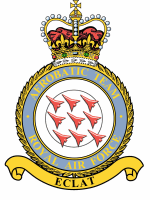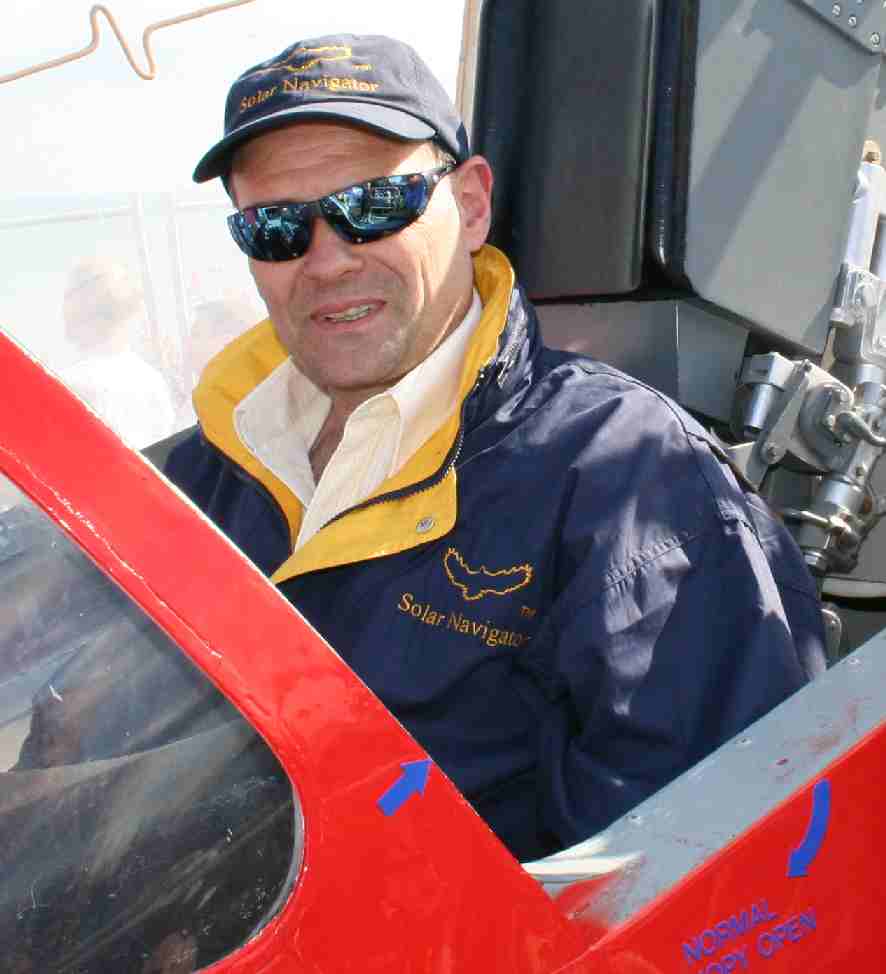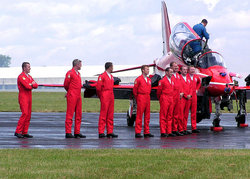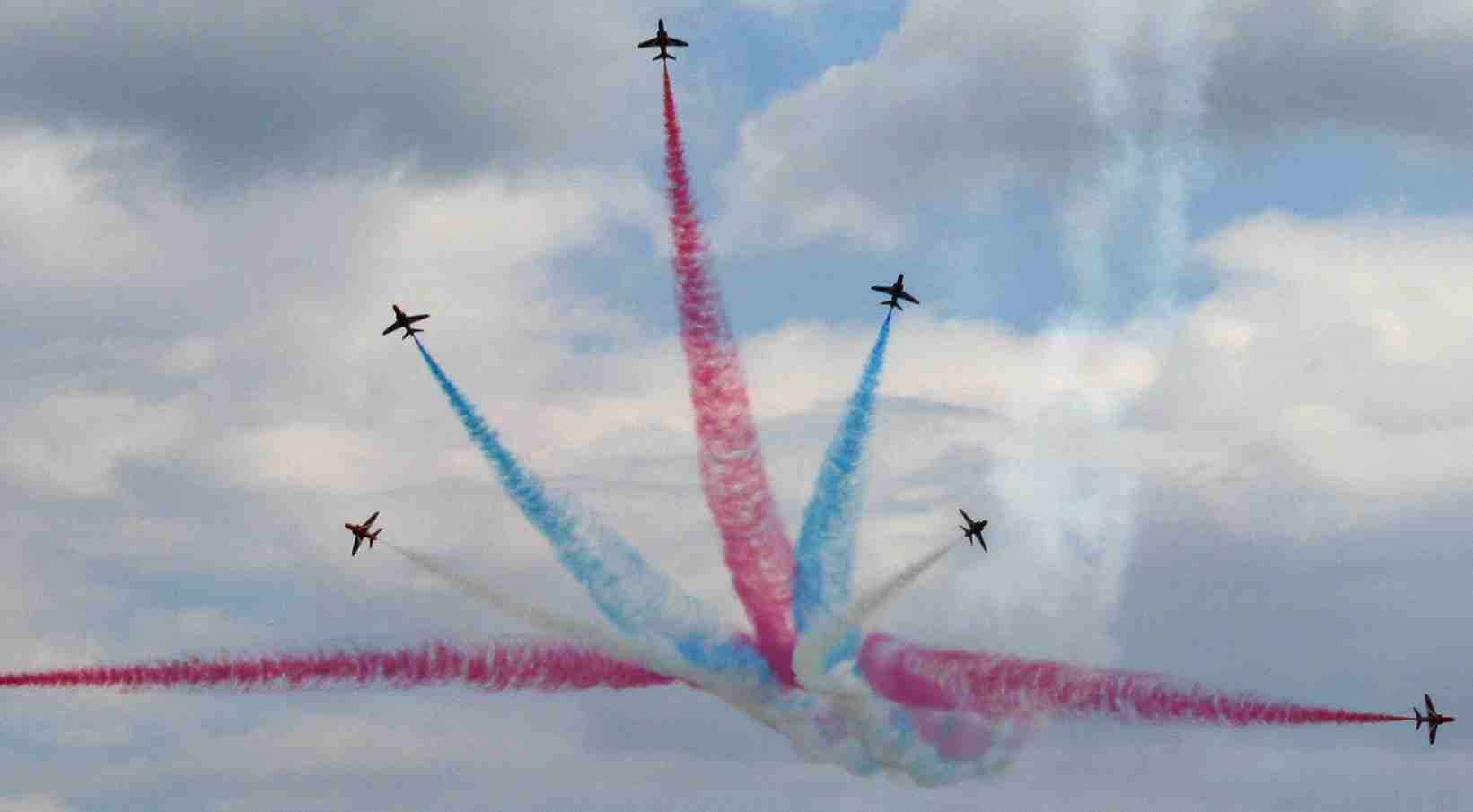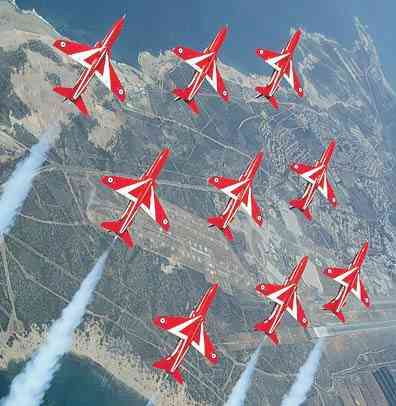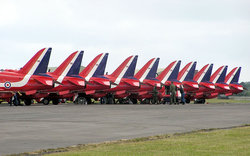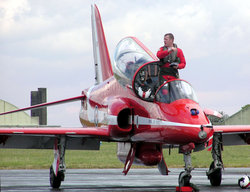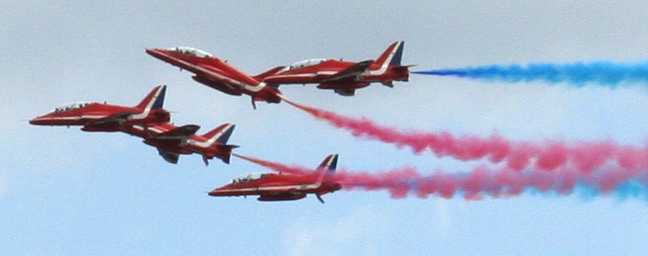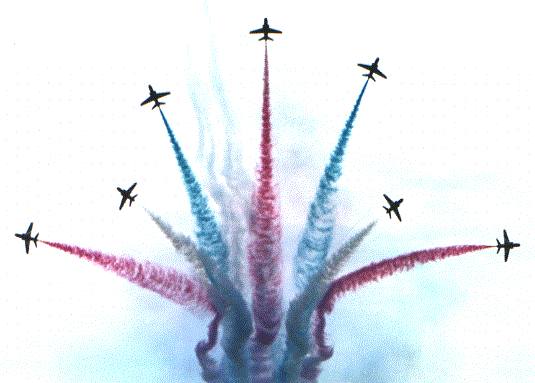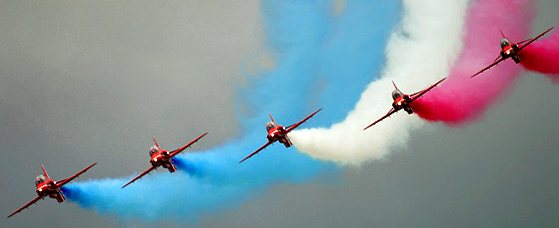|
|
|||||||||||||||||||||||||||||||||||||||||||||||||||||||||||||||||||||||||||||||||||||||||||||||||||||||||||||||||||||||||||||||||||||||||||||||||||||||||||
|
HOME | BIOLOGY | FILMS | GEOGRAPHY | HISTORY | INDEX | INVESTORS | MUSIC | NEWS | SOLAR BOATS | SPORT |
|||||||||||||||||||||||||||||||||||||||||||||||||||||||||||||||||||||||||||||||||||||||||||||||||||||||||||||||||||||||||||||||||||||||||||||||||||||||||||
|
Acknowledged as one of the worlds premier aerobatic teams, The Red Arrows are the public face of the Royal Air Force. The Red Arrows exist to demonstrate the professional excellence of the RAF and promote recruitment to the RAF. Evidence shows that The Red Arrows have inspired a significant number of people to join the RAF, both as officers and airmen, and to all trades, not just aircrew.
The Team contributes to Defence Diplomacy, and supports wider British interests through the promotion of British industry overseas. The Hawk aircraft flown by the Team and most of its components are all British made. Thus during overseas tours The Red Arrows demonstrate both British skill and British technology to an enormous number of people each year.
Nelson Kruschandl tries a Red Arrows BAE Hawk
Team
Members | News
| Contact
Us | Manoeuvres
| Macmillan
Appeal
The Red Arrows, officially known as the Royal Air Force Aerobatic Team, is the aerobatics display team of the Royal Air Force, based at RAF Scampton, United Kingdom. The Red Arrows badge shows the aircraft in their trademark diamond nine formation, with the motto Eclat, meaning "brilliance" or "excellence". They were formed in late 1964 as an all-RAF team, replacing a number of unofficial teams that had been sponsored by various RAF commands.
Initially, the Red Arrows were equipped with seven Folland Gnat trainers which were inherited from another RAF display team, The Yellowjacks and had been chosen because they were less expensive to operate than the front-line fighters. In their first season, they flew at 65 shows across Europe. In 1966, the team was increased to nine members, enabling them to develop their Diamond Nine formation. In late 1979, they switched to the BAE Hawk trainer. The Red Arrows have now given shows world-wide, in over fifty countries and are widely held as the worlds most skilled and famous military aerobatics team.
THE PILOTS
Red Arrows pilots line up
Since 1966, there have been nine display pilots each year; all are volunteers. Pilots must have completed one or more operational tours on a fast jet such as the Tornado, Harrier or Jaguar, and 1500 flight hours to be eligible. Even then, there are more than ten applicants for each place on the team. Pilots stay with the Red Arrows for a three year tour of duty. Changing three pilots a year ensures the experience level within the Team is never low as there are always three first year pilots, three second year pilots, and three in their final year. As few female pilots have completed a tour of duty on a fast jet, there have not yet been any female Red Arrows pilots.
The Red Arrows have no reserve pilots for safety reasons, as a spare pilot would not perform often enough to fly to the standard required. If one of the pilots is not able to fly, the Team is able to fly an eight-plane formation, in which case the team leader will change the positions of the other pilots to maintain the most pleasing effect. If the Leader is unable to fly for any reason, then the Red Arrows will not fly at all. Each pilot always flies the same position within a formation. The pilots spend six months from October to April practicing for the coming display season.
During a routine, Red Arrows pilots regularly experience forces up to five times that of gravity and when performing the aerobatic maneuver 'Vixen Break', forces up to 7g can be reached, close to the 8g structural limit of the aircraft. As well as the nine pilots, 'Red 10', also known as the Road Manager, is a fully qualified Hawk pilot who flies the tenth aircraft when the Red Arrows are away from base. This means the team have a reserve aircraft at the display site. Red 10's duties include co-ordination of the display and acting as the team's Ground Safety Officer. Red 10 also flies TV cameramen and photographers for air-to-air pictures of the Red Arrows.
Red Arrows Eastbourne International Airshow © 2005 Nelson Kruschandl
DISPLAYS
The first display by the Red Arrows was at RAF Little Rissington on 6 May 1965. The display was to introduce the Royal Air Force Aerobatic Team to the media. However, the first public display was on 9 May 1965 in France, at the French National Air Day in Clermont-Ferrand. The first public display in the UK was on 15 May 1965 at the International Air Fair at Biggin Hill. The first display with nine aircraft was watched by the Duke of Edinburgh and was on 8 July 1966 at RAF Little Rissington.
The first display in Germany was at RAF Laarbruch on 6 August 1965, and since then the Red Arrows have performed in Germany 170 times. However, the Red Arrows' last display in Germany was on 22 August 1988 after formation aerobatics were banned in Germany following the Italian Air Force Frecce Tricolori accident on 28 August 1988 in Ramstein.
During displays, the aircraft do not fly directly over the crowd; any manoeuvres in front of and parallel to the audience can be as low as 300 feet, the 'synchro pair' can go as low as 100 feet straight and level, or 150 feet when in inverted flight. To carry out a full display, the cloud base must be above 4,500 feet; if it is below 2,500 feet then they will perform a 'flat' display, which consists of fly-pasts and steep turns.
One of the biggest crowds to see the Red Arrows was in Lisbon on 13 June 1973, when there was a crowd of 650,000 people, a statistic not exceeded until 1996 in Sydney. The greatest number of displays flown in any year was in 1995, when the Red Arrows performed 136 times. The smallest number of displays in one year was in 1975, after the 1973 oil crisis limited their appearances.
In 1977, a charge of £200 was introduced for a Red Arrows display. By 2000, the charge had become £2,000 (including VAT and insurance). To date (April 2005), the Red Arrows have performed over 3,400 times.
UK residents may occasionally see the Red Arrows on a "transit flight" (getting to the display location). On these transit flights, the team flies at the relatively low altitude of 1,000 feet. This avoids the complication of moving though the cloud base in formation, and also avoids much controlled air space. Jets are more efficient at higher altitude, so longer flights are made at 35,000 to 42,000 feet.
The smoke trails left by the team are made by releasing diesel into the exhaust; this oxidises straight away, leaving a white smoke trail. Dyes can be added to produce the different colours. The diesel is stored in the pod on the underside of the plane; originally designed to carry a 30mm Aden cannon, it now houses three tanks: one 50-gallon tank of pure diesel and two 10-gallon tanks of blue- and red-dyed diesel. The smoke system uses ten gallons per minute; therefore each plane can trail smoke for a total of seven minutes.
TEAM HISTORY
Predecessors
The Red Arrows are not the first RAF aerobatics team; in fact the first RAF biplane pageant was held at Hendon in 1920. The biplane teams were made up of Gauntlets and Gladiators from front-line squadrons. In 1938, three Gladiators flew with their wing-tips tied together. The Second World War largely stopped formation aerobatics, as planes were clearly needed elsewhere.
In 1947, the first jet team of three Vampires came from Odiham Fighter Wing. Various teams flew the Vampire, and in 1950, No 72 Squadron was flying a team of seven. No 54 Squadron became the first RAF jet formation team to use smoke trails. Vampires were replaced by Meteors, No 66 Squadron developing a formation team of six aircraft. Hunter aircraft were first used for aerobatics teams in 1955, when No 54 Squadron flew a formation of four. The next year they adopted the name The Black Knights; all the pilots wore black flying suits.
10 Red Arrows Hawks line up ready for the display
The official RAF team was provided by No 111 Squadron ('Treblers' or 'Treble-One') in 1956, and for the first time the aircraft had a special colour scheme, which was an all-black finish. After a demonstration in France, they were hailed as 'Les Fleches Noires' and from then on known as The Black Arrows. This team became the first team to fly a five-Hunter formation. The Black Arrows' greatest moment was the loop and barrel roll of 22 Hunters during the 1958 Farnborough Air Show. This is a world record for the greatest number of aircraft looped in formation, a record unbroken to this day. The Black Arrows were the premier team until 1961, when The Blue Diamonds (No 92 Squadron) continued their role, flying sixteen blue Hunters. In 1960, The Tigers (No 74 Squadron) were re-equipped with Lightnings and performed wing-overs and rolls with nine aircraft in tight formation. In 1962, they became the RAF's premier team. They sometimes gave co-ordinated displays with the Blue Diamonds.
Yet another aerobatics team was formed by No 56 Squadron, The Firebirds, with nine red and silver Lightnings. In 1964, The Red Pelicans, flying six Jet Provost T Mk 4s, assumed the role of the RAF's leading display team. In that same year, a team of five yellow Gnat trainers from No 4 Flying Training School displayed at the Farnborough Air show. This team became known as the Yellowjacks after Flight Lieutenant Lee Jones's call sign, "Yellowjack"; the name was briefly 'Daffodil Patrol', but was quickly changed back.
In 1964, it was decided to amalgamate all the existing RAF display teams, as it was feared pilots were spending to much time practising formation aerobatics rather than operational training. The new team name took the word red from the fact that the Yellowjacks' planes had been painted red (possibly in an effort to lose the name Yellowjacks) and arrows after the Black Arrows; however some think red was a tribute the to the Red Pelicans.
The Red Arrows arrive
The Royal Air Force Aerobatic Team (RAFAT), the Red Arrows, was originally based at RAF Fairford, then a satellite unit of the Central Flying School. The team later moved to RAF Kemble, and after RAF Scampton became the CFS Headquarters, the Red Arrows moved there in 1983. As an economy measure, Scampton closed in 1995, so the Red Arrows moved just twenty miles to RAF Cranwell; however, as they still used the air space above Scampton, the emergency facilities and runways had to be maintained. Since December 21, 2000, the Red Arrows have been based again at RAF Scampton, near Lincoln.
Red Arrows pilot exits his Hawk aircraft
The first team had seven display pilots and flew the Folland Gnat jet trainer. By the end of their first season, the Red Arrows had displayed 65 times in Britain, France, Italy, Holland, Germany and Belgium and were awarded the Britannia Trophy by the Royal Aero Club for their contribution in the field of aviation.
After dispaying 1,292 times in the Gnat, the Red Arrows took delivery of the Hawk trainer in the winter of 1979. Since being introduced into service with the Red Arrows, the Hawk has performed with the Red Arrows in fifty countries.
On the 9 September 2003, a Red Arrow jet veered off the runway at Jersey airport. By the quick reflexes of the pilot, Flight Lieutenant Jez Griggs, the jet was run into a gravel pile and little damage was caused. No one was injured. Displays were not affected because the Red Arrows take a spare aircraft with them.
In July 2004 there was speculation in the British media that the Red Arrows would be disbanded, after a defence spending review, due to running costs of between £15 million and £20 million. The Arrows were not disbanded and the expense has been justified through the public relations value of the arrows, because the Red Arrows help develop business in the defence industry and they also because act as a recruitment mechanism for the RAF.
According to the BBC, it is highly unlikely that the Red Arrows will be disbanded, as they are a considerable attraction throughout the world.
Red Arrows escort Concorde Queens Golden Jubilee London flyover
VIDEO GAME
In 1985, Database Software released a flight simulator called Red Arrows, made in cooperation with the flight team. In the simulator, stunts have to be performed while flying in formation. It was available for ZX Spectrum, Commodore 64, Amstrad, Electron, BBC Micro and Atari.
Notes
References
Red Arrows Eastbourne International Airshow © 2005 Nelson Kruschandl
Royal
Navy
| Army
| Ministry of
Defence Equipment
| Squadrons
| Stations
| Organisation
| Government
THE RED ARROWS' AIRCRAFT
The Red Arrows operate 12 Hawk 1/1a aircraft, as follows:
Displays August 2005
Displays September 2005
Red Arrows Eastbourne International Airshow © 2005 Nelson Kruschandl
AIRLINE OPERATORS:
AVIATION A - Z
Healthier alternative tastes for adventure capitalists
Solar Red | Solar Crush | Solar Cola | Solar Spice | Solar +
|
|||||||||||||||||||||||||||||||||||||||||||||||||||||||||||||||||||||||||||||||||||||||||||||||||||||||||||||||||||||||||||||||||||||||||||||||||||||||||||
|
This
website
is Copyright © 1999 & 2007 NJK. The bird |
|||||||||||||||||||||||||||||||||||||||||||||||||||||||||||||||||||||||||||||||||||||||||||||||||||||||||||||||||||||||||||||||||||||||||||||||||||||||||||
|
AUTOMOTIVE | BLUEBIRD | ELECTRIC CARS | ELECTRIC CYCLES | SOLAR CARS |
 THE RED ARROWS
THE RED ARROWS 